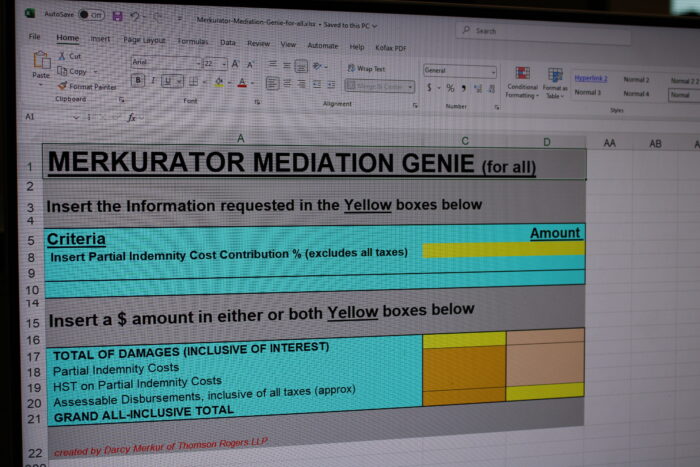What Is My Personal Injury Claim Worth?
Author(s): Adam J. Karakolis
January 18, 2021

When valuing your personal injury claim you should consider five areas of damages:
- Your pain and suffering;
- Your need to pay for medical, rehabilitation, and attendant care;
- Your need to pay for housekeeping and home care expenses;
- Your ability to work and your loss of income; and
- Your injuries’ effect on your family members.
Damages refer to money that a Court will award to you. A Court will add up the first four damages areas listed above to calculate a total amount of money paid to you if your personal injury claim is successful. The fifth area of damages listed above will be paid to family members who join in your successful personal injury claim. Let’s look at each area of damages in detail.
1) Your pain and suffering
A Court will assess your pain and suffering, which is also referred to as non-pecuniary damages. This assessment looks at your pain and suffering, the loss of quality of your life, the loss of the duration of your life, and the loss of the likelihood of entering a permanent relationship with another person resulting from your injuries.
Calculating your pain and suffering is tricky. It is difficult to quantify non-pecuniary damages with a dollar value. For example, the cost of living with pain cannot be valued in the same way as the cost of a physiotherapy appointment.
The total value of your non-pecuniary damages is limited by the Supreme Court of Canada. In 1978, the Supreme Court of Canada set this limit at $100,000.00. Since this limit is adjusted with inflation, the maximum value of your non-pecuniary damages in 2020 is $388,159.59.
It is important to remember that the $388,159.59 non-pecuniary damages limit is reserved for cases involving the most pain and suffering. Even serious injuries such as broken bones can fall short of this limit. Cases which are awarded the maximum typically involve victims who suffer quadriplegia or severe brain damage.
2) Your need for money to pay for medical, rehabilitation, and attendant care
The value of your claim in this area is assessed under the heading of medical, rehabilitation and attendant care damages. Calculating the value of your claim in this area is more straightforward than under the pain and suffering heading.
First, you are entitled to be reimbursed for your past expenses for medical, rehabilitation, and attendant care. Doctor’s appointments, physiotherapy, personal-support worker fees, and other expenses which you have paid for out of your own pocket towards your care can be claimed under this heading. Be sure to save receipts or other forms of proof of payment so that you can prove the expenses you have incurred.
Second, you are entitled to damages for your future costs of medical, rehabilitation, and attendant care. To assess your future cost of care, you will typically attend an appointment with an expert such as an occupational therapist or physiatrist. This expert will assess you and create a report to estimate the cost of your future care. For example, an expert might find that you need physiotherapy appointments twice per week for the next twenty years to manage your injuries. Your damages claim would then amount to the cost of the weekly appointments for the next twenty years.
3) Your need for money to pay for housekeeping and home care expenses
This heading examines your need to pay for expenses related to housekeeping and home care that you cannot perform due to your injuries and impairments. This damages heading is assessed similarly to the previous heading for medical, rehabilitation, and attendant care damages.
First, this heading looks at your past expenses paid out of pocket for housekeeping and home care related to your injuries. An example can help clarify how damages are assessed in this area. Let’s say that John injures his back in a motor vehicle accident in 2017. Before his accident, John shoveled his driveway every winter. His back injury now prevents him from shoveling. John hired a snow clearance service in 2018 and 2019 to clear snow from his driveway. If John wins at trial in 2020, John is entitled to be reimbursed for the past cost of the snow clearance service he paid in 2018 and 2019.
Second, this heading looks at the cost of your future housekeeping and home care. In the same example, if John’s back injury fails to heal, he will need to pay for snow clearance services in the future. This damages heading is calculated similarly to medical, rehabilitation, and attendant care damages: an expert will typically assess you and create a report quantifying the cost of your future housekeeping and home care needs.
4) Your ability to work and your loss of income
This damages heading assesses your past loss of income, future loss of income, and loss of competitive advantage.
Past loss of income examines income which you have lost due to your injuries. For example, if John’s back injury causes him to miss three months of salaried work, he is entitled to claim the value of his three months of missed salary. Evidence of your lost salary can come in the form of your income tax returns or an employment record illustrating the salary you were typically paid and the amount of work missed. If your injury results from a motor vehicle accident, you are only entitled to claim 70% of the value of your past income lost.
Future loss of income looks at your injuries’ impact on your ability to earn income moving forward. In our example, if John’s back injury will force him to retire five years earlier than he would have retired without the injury, he can claim for the loss of income for those five years. This heading is usually assessed by an expert who will meet with you and assess your loss. Evidence of your loss of future income typically comes from your income taxes and employment record.
Loss of competitive advantage concerns your ability to transition to other forms of employment whether through raises, promotions, or movement to other jobs. It is a component of your future loss of income claim. For example, John’s back injury causes a loss of competitive advantage if it prevents him from performing the duties he would need to perform to qualify for a promotion. Even if the back injury does not affect John’s ability to perform his current job, its effect on John’s ability to be promoted causes a loss of competitive advantage.
5) Your injuries’ effect on your family members
These damages are payable not to you, but to your family members. Your family members can claim for damages in five areas relating to your injuries and impairments’ effect on them.
(a) your family members’ actual and reasonable expenses incurred for your benefit
Your family members can claim for money which they spent to assist you in recovering from your injuries and impairments. Family members who pay for appointments, assistive devices, or any other expenses should keep a receipt or proof of payment so they can make their claims under this damages heading.
(b) your family members’ actual and reasonable expenses incurred for a victim’s funeral
Family members of a deceased victim can claim for money spent on funeral expenses.
(c) your family members’ reasonable travel expenses incurred to visit you during treatment or recovery
Your family members can claim for plane tickets, hotel expenses, and other similar costs incurred to visit you after your injury. These expenses can be claimed both for trips to visit you while you are in hospital and to visit you at home to provide care post-hospital.
(d) payment for your family members who lose income while taking time off work to provide your treatment or payment for the value of nursing, housekeeping, or other services these family members provide for you
Your family members can claim for income lost while taking time away from work to provide for your care. Your family members can, alternatively, claim for the value of services which they provided to you for your care. For example, if your family member acts as a personal support care worker for you, they are entitled to be paid for the work they do for you as if they were a personal support worker.
(e) payment for damage to your family members’ relationship with you
Your family members can claim for damage to their relationship with you caused by your injuries and impairments. The law refers to this damage to your relationship as a loss of care, guidance, and companionship. Like pain and suffering, this heading of damages is more difficult to quantify than damages which can be proved through receipts.
Your family members’ claim for loss of guidance relates to advice or teachings that you would give your family member. For example, John’s child might claim for the loss of John’s financial advice, which John cannot give due to a brain injury he suffered as a result of his accident.
Your family members’ claim for loss of care relates to services you have not been able to perform or will not be able to perform for your family member. For example, John’s elderly parents could claim for the loss of home repairs which John used to perform for them, but no longer can because of his injuries.
Your family members’ claim for loss of companionship relates to the benefit of your friendship. Your injuries and impairments’ effect on your interactions with your family members, and the negative effect on your relationship with them is compensable under this damages heading.
CONCLUSION
The total value of your claim is comprised of the total of the damages headings:
1) Your pain and suffering;
2) Your need for money to pay for medical, rehabilitation, and attendant care;
3) Your need for money to pay for housekeeping and home care;
4) Your ability to work and your loss of income; and
5) Your injuries’ effect on your family members.
Headings 1-4 comprise the funds which you will be awarded. Heading 5 comprises the funds that any of your claiming family members will be awarded.
A note about deductibles and motor vehicle accidents
It is important to consider deductibles when valuing your claim if your injuries and impairments result from a motor vehicle accident. You should consult a lawyer to determine how deductibles apply to your claim in these circumstances.
Adam J. Karakolis is a personal injury lawyer and associate at Thomson Rogers. Adam can be reached at 416-868-3181 or by EMAIL.
Share this





